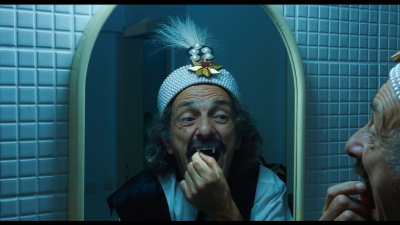
© Saga Film
78-й Міжнародний кінофестиваль у Локарно (6–16 серпня, Швейцарія) став історичним для румунської кіноіндустрії — вперше у програмі одразу три стрічки з її участю. У головному конкурсі Concorso Internazionale представлено «Dracula» Раду Жуде — сміливий мета-експеримент, що поєднує сатиру, політичне кіно, комедію та еротику в новому прочитанні легенди про вампіра. Стрічка створена у співпраці з Австрією та Люксембургом, а акторський склад об’єднує як румунських, так і європейських зірок. У секції Cineasti del Presente дебютує повнометражна робота Андрея Епуре «Nu mă lăsa să mor» — медитативна історія про самотність і втрату, де абсурдний гумор сусідить із глибокою емоційністю. Третя учасниця конкурсу — Івана Младенович зі стрічкою «Sorella di Clausura», балканською трагікомедією про межу між мрією та реальністю, знятою у копродукції Румунії, Сербії, Італії та Іспанії. Кінокритики називають цю присутність найпотужнішою в історії румунського кіно в Локарно. Для фестивалю, відомого своєю сміливою програмною політикою та культовими вечірніми показами на Piazza Grande, це ще один доказ, що румунські режисери впевнено заявляють про себе на світовій сцені, пропонуючи глядачам авторське кіно з виразною ідентичністю.
Three Romanian Films in the Spotlight at Locarno 2025
The 78th Locarno International Film Festival (6–16 August, Switzerland) has marked a historic moment for the Romanian film industry — for the first time, three films with significant Romanian involvement are featured in the programme. In the main competition, Concorso Internazionale, Radu Jude’s “Dracula” is presented as a daring meta-experiment blending satire, political cinema, comedy, and eroticism in a bold reinterpretation of the vampire legend. The film is a co-production with Austria and Luxembourg and brings together both Romanian and European stars in its cast. In the Cineasti del Presente section, Andrei Epure’s feature debut “Nu mă lăsa să mor” (Don’t Let Me Die) unfolds as a meditative story about solitude and loss, where absurd humour coexists with profound emotional depth. The third competition entry is Ivana Mladenović’s “Sorella di Clausura”, a Balkan tragicomedy exploring the fine line between dreams and reality, co-produced by Romania, Serbia, Italy, and Spain. Film critics describe this as the most significant Romanian presence in the history of Locarno. For a festival renowned for its bold curatorial choices and iconic evening screenings at Piazza Grande, it is yet another sign that Romanian filmmakers are confidently making their mark on the world stage, offering audiences auteur cinema with a distinctive identity.
2241